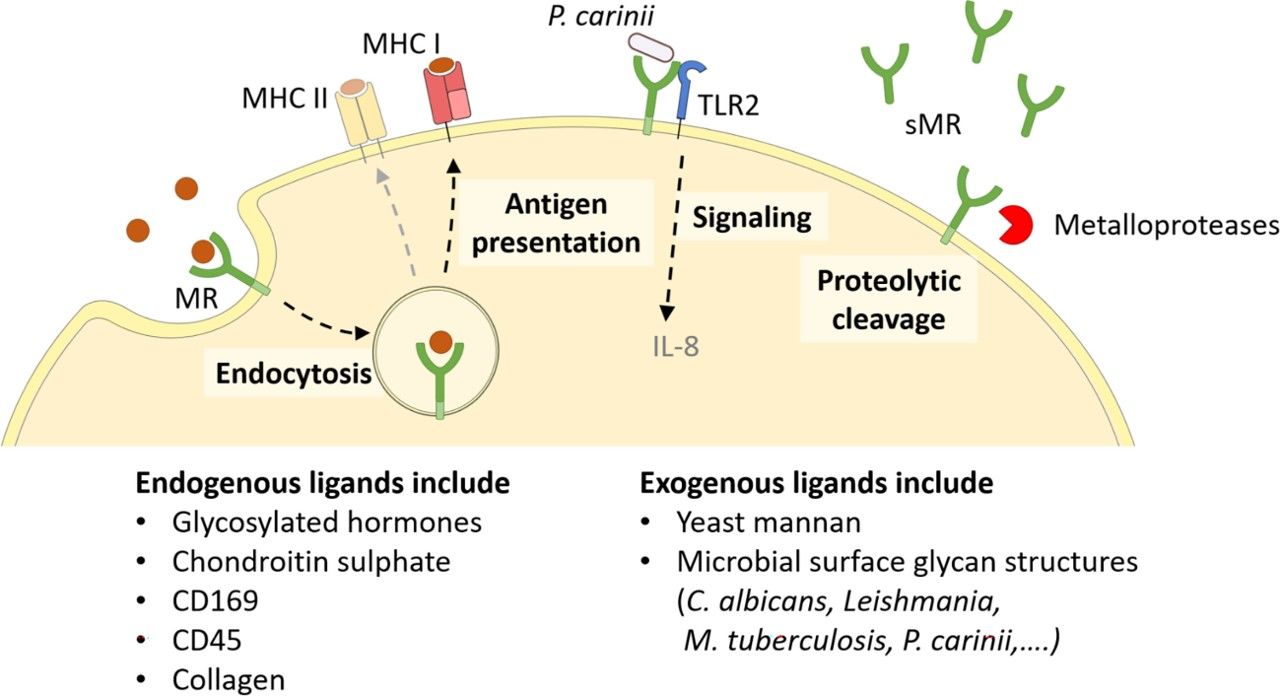Carbohydrate-modified Liposome Development Service
One of the most prevalent chemical compounds found in nature is carbohydrates, which are made up of carbon, hydrogen, and oxygen. Carbohydrates can generate ATP for cellular energy via glycolysis. Tumor cells contain an abundance of glucose transporters because they need a lot more ATP to survive than normal cells do. Creative Biolabs has extensive expertise with surface-modified liposomes, and we can help you with tumor targeting by modifying carbohydrates as a ligand on liposomes.
 Fig.1 Extracellular ligands are recognized by the mannose receptor (MR).1,2
Fig.1 Extracellular ligands are recognized by the mannose receptor (MR).1,2
Advantages of Carbohydrate-modified Liposome
Carbohydrates possess low toxicity and excellent structural stability, biocompatibility, biodegradability, low immunogenicity, targeting specificity, and adhesive properties, which can complement the shortcomings of liposomes and achieve efficient drug delivery.
-
Targeted drug delivery: Most cells include receptors that identify certain carbohydrates, such as the asialoglycoprotein receptor (ASGPR). Carbohydrate-modified liposomes can deliver drugs to specific targets via ligand-receptor binding.
-
Protein-repellent behavior: Opsonins in the circulation stimulate liposome absorption by the reticuloendothelial system (RES), which reduces drug delivery efficiency. Carbohydrates like mannose are structurally similar to glycogen and are difficult to opsonize.
-
Enhanced stability: Carbohydrates are typically negatively/positively charged, and the surface charge increases when liposomes are modified with them. The increased surface charge improves the aggregation stability of liposomes by preventing liposome fusion and aggregation.
-
Sustained release: Carbohydrates establish a tight shell on the surface of liposomes to protect them from gastric acid destruction and retain their integrity, preventing premature drug release.
-
High encapsulation efficiency: Carbohydrates improve encapsulation efficiency by lowering membrane fluidity and drug leakage in liposomes.
-
Increased biocompatibility and biodegradability.
Optional Carbohydrates for Liposome Surface Modification
Creative Biolabs can provide you with a broad range of carbohydrate-modified liposomes to meet your specific demands for different receptors and cells.
|
Carbohydrate
|
Efficacy
|
|
Glucose
|
Promoting the binding of liposomes to glucose transporters (GLUT), which is expressed in tumor cells.
|
|
Mannose
|
Promoting the specific binding of liposomes to mannose receptor (MR), which is expressed in macrophages, dendritic cells and keratinocytes.
|
|
Galactose
|
Promoting the specific binding of liposomes to ASGPR, which is expressed in hepatocytes.
|
|
Lactose
|
|
Chitosan
|
Improve liposome encapsulation efficiency and stability, prolongs drug circulation time, and minimizes drug leakage and premature release.
|
|
Pectin
|
Liposomes can be negatively charged to improve their stability and targeting abilities, as well as increase the drug's bioavailability.
|
|
Fucose
|
Promoting the binding of liposomes to pancreatic cancer cells.
|
|
Hyaluronic Acid
|
Promoting the binding of liposomes to CD44, which is overexpressed in tumor cells.
|
|
Sialic acid
|
Promoting the binding of liposomes to CD22.
|
Why Choose Us?
-
Extensive development experience
-
Top-quality products and services
-
Timely assistance and delivery
-
Rigorous quality control and characterization
Creative Biolabs, a pioneer in liposome development, is committed to offering top-notch products and services to clients. We provide comprehensive technical support, solutions, and liposome development, with a focus on customized carbohydrate-modified liposomes. Please do not hesitate to contact us, as we will become your most competent and trusted partner.
References
-
Van der Zande, Hendrik JP, et al. "The mannose receptor: from endocytic receptor and biomarker to regulator of (meta) inflammation." Frontiers in immunology 12 (2021): 765034.
-
under Open Access license CC BY 4.0, without modification.

For Research Use Only. Not For Clinical Use

 Fig.1 Extracellular ligands are recognized by the mannose receptor (MR).1,2
Fig.1 Extracellular ligands are recognized by the mannose receptor (MR).1,2
 For Research Use Only. Not For Clinical Use
For Research Use Only. Not For Clinical Use


